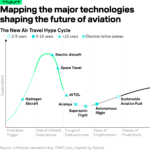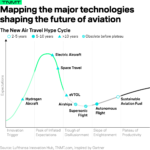“The Article Was Originally On athletenonstop”
Emerging Technology Innovations Set To Transform The Airline Industry

The airline industry has been significantly impacted by the COVID-19 pandemic, leading to an unprecedented drop in passenger demand and revenues. However, airlines are already implementing robust recovery strategies, adapting to the ‘new normal.’ A key trend is the increased focus on health and safety protocols, with airlines investing in advanced cleaning methods, touchless technology, and improved air filtration systems. Furthermore, flexible booking policies are being adopted to enhance customer confidence. The industry is also expected to prioritize sustainability, with investments in eco-friendly technologies and practices. These strategies highlight the industry’s resilience and commitment to bounce back stronger post-pandemic.
The Rise Of Sustainable Aviation Green Trends In The Airline Sector
The COVID-19 pandemic has significantly disrupted the airline industry, leading to a sharp decline in passenger demand and revenue. However, industry leaders are developing future recovery strategies to adapt to the new normal. These strategies focus on enhancing passenger safety measures, adopting digital technologies, and implementing flexible booking policies.

Additionally, airlines are looking into diversifying their revenue streams and promoting sustainable travel to regain customer trust. As the industry’s transformation continues, the post-pandemic era is expected to witness a gradual resurgence of air travel, with a renewed emphasis on health and sustainability..
How The Airline Industry Is Adapting To Changes In Consumer Behaviour
The global pandemic has left an indelible imprint on the airline industry, causing unprecedented disruption and financial loss. However, the industry is steadily planning its recovery strategies. One significant trend expected in the coming years is a focus on health and safety measures.

Airlines will be investing more in sanitization procedures, contactless technology, and adjustments to inflight services. Additionally, it’s predicted there will be an increase in flexible ticketing options to reassure passengers in an era of uncertainty. The future of the airline industry lies in its ability to adapt and innovate in response to the challenges posed by COVID-19..
The Increasing Importance Of Data Analytics In The Future Of Aviation
In the wake of COVID-19, the airline industry faced unprecedented challenges, leading to a sharp downturn. However, with resilient recovery strategies, the industry is steadily soaring back. The pandemic has expedited digital transformation in airlines, with many incorporating touchless technology and heightened hygiene measures to assure passenger safety.

Furthermore, airlines are focusing on sustainable solutions, such as eco-friendly aviation fuel, to reduce their environmental impact. COVID-19 has also highlighted the importance of flexible booking policies and superior customer service. Thus, the future of the airline industry post-pandemic will be characterized by enhanced passenger experience, digital innovation, and sustainability..
The Impact Of COVID On The Airline Industry And Its Future Recovery Strategies
The pandemic has dramatically altered the airline industry’s landscape, with COVID-19 causing unprecedented disruptions. Airlines are now exploring innovative strategies for recovery. These include an increased focus on hygiene protocols, implementing contactless technology, and offering flexible booking options to reassure and attract passengers.
Furthermore, airlines are expected to accelerate their digital transformation efforts, optimizing operations and enhancing customer experience. As the industry navigates the post-pandemic landscape, sustainability will also be a key focus, with airlines investing in greener technology to reduce their carbon footprint. These trends will shape the future of the airline industry as it recovers and adapts to the ‘new normal.’.




